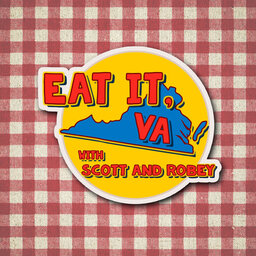Duron Chavis plants food justice seeds one garden at a time
For Duron Chavis, the founder and executive director at The Happily Natural Day, food is much more than breakfast, lunch, and dinner.
"I think food, especially the act of growing food, is one of the most practical, accessible tools of resistance that communities can utilize to take their power back," Chavis told Eat It, Virginia! podcast hosts Scott Wise and Robey Martin. "When I say take your power back, I mean, health-wise, we live in communities that don't have access to grocery stores or healthy food in general. The act of you growing your own food is you practicing agency and determining for yourself what your input is going to be. That's just the individual level, right? But on a communal level, the act of growing food is and builds community."
Through his food justice community activism and non-profit work, Chavis is training volunteers to plant gardens in communities where fresh food is needed the most.
"The Resiliency Garden Project is designed to help increase people's access to healthy food. Through COVID, lots of folks lost their jobs are lost people were laid off. So we said, one of the things that is going to be challenging is if people have less money, then that means that they have less food. And once COVID started hitting, really started seeing shortages of food and different types of products inside of the grocery store. So I tried to figure out how we can help people have more immediate access to food in their homes, by the virtue of them growing their own food," he said. "So if you're food insecure, you can apply for a raised bed and go on our website, click the link, put in your name, address, phone number, and you'll be put into a queue. A volunteer, once your materials are ready, they'll contact you and come out and build you a raised bed. Six by four size, 12-inches high, it's about a cubic yard with the soil. Then volunteers will also bring you some seedlings to help you get your raise pit started. So it's really simple. It's nothing complicated at all. It's really our way of trying to help people connect to where their food comes from, as well as help mitigate people's lack of food access."
To learn more about Chavis' work and impact in the community, download Eat It, Virginia!
Links mentioned in the podcast:
In 1 playlist(s)
Eat It, Virginia!
Hungry for the stories behind Richmond’s best chefs, restaurants, and culinary creators? 🍽️ Eat It,…Social links
Follow podcast
Recent clips

Tim Gearhart: Gearharts Fine Chocolates
1:07:43

Pinky’s = Tapas, Pork Belly Magic & a Whole Lotta Love | Eat It, Virginia: On the Road
22:24

Memi Shehata and Rania Yacoub: Memi’s
59:14
 Eat It, Virginia!
Eat It, Virginia!